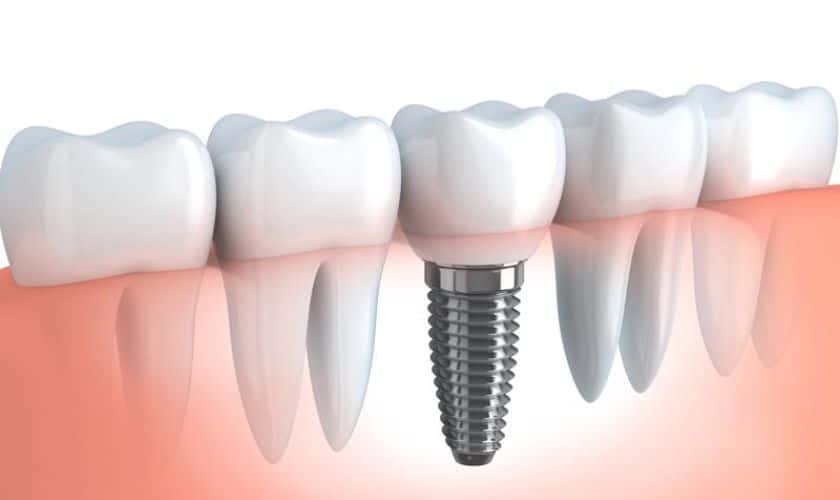Pearl Dental Blog

How Should I Maintain My Dental Implants?
Welcome to our blog post on maintaining dental implants! If you’ve recently undergone the transformative process of getting dental implants, congratulations are in order. Dental implants not only restore your smile and confidence but also provide a long-lasting solution for missing teeth. However, like any investment, they require proper care and maintenance to ensure their durability and functionality.
In this article, we will explore the benefits of dental implants, discuss why it is essential to maintain them properly, and provide you with practical tips on how to keep your dental implants in excellent condition. So let’s dive right in and discover how you can preserve that beautiful smile for years to come!
Benefits of Dental Implants
Dental implants are a revolutionary solution for replacing missing teeth. Unlike traditional dentures or bridges, dental implants offer numerous benefits that can greatly improve your oral health and quality of life.
First and foremost, dental implants provide a permanent and stable foundation for replacement teeth. This means you can eat, speak, and smile with confidence knowing that your implant-supported teeth will stay in place. No more worrying about embarrassing moments or discomfort while eating!
Another major benefit of dental implants is their ability to preserve the integrity of your jawbone. When a tooth is lost, the surrounding bone begins to deteriorate over time. However, dental implants stimulate the bone tissue just like natural teeth do, preventing further bone loss and preserving facial structure.
Furthermore, dental implants look and feel incredibly natural. They are custom-made to match the shape, size, and color of your existing teeth so they blend seamlessly into your smile. Plus, because they are anchored directly into the jawbone instead of relying on neighboring teeth for support like traditional bridges do,
The Importance of Maintaining Dental Implants
Maintaining your dental implants is crucial for their longevity and overall oral health. Proper care ensures that your implants stay strong, functional, and free from complications.
Regular maintenance helps prevent the buildup of plaque and bacteria around the implant area. Just like natural teeth, implants can develop gum disease if not adequately cleaned. This can lead to inflammation or even bone loss in severe cases.
Maintaining dental implants promotes good oral hygiene habits. By following a consistent daily care routine, you not only protect your implants but also keep your remaining natural teeth healthy. Brushing twice a day with a soft-bristle toothbrush and using interdental brushes or floss will help remove food debris and plaque.
Furthermore, avoiding certain foods is important for implant maintenance. Sticky candies, hard nuts or seeds, and tough meats can put unnecessary strain on implant restoration or cause damage to surrounding tissues. It’s best to opt for softer foods that are easier to chew.
In addition to personal efforts at home, regular checkups with your dentist are essential. They will assess the condition of your dental implants during routine examinations and cleanings while addressing any concerns promptly.
Being aware of potential problems with dental implants is vital for early detection. A professional should evaluate signs such as persistent pain or discomfort around the implant site immediately to avoid further complications down the line.
By understanding the importance of maintaining dental implants and taking proper care of them through daily routines and professional checkups, you ensure their durability and enjoy long-term benefits without any inconvenience!
Daily Care Routine for Dental Implants
Taking care of your dental implants is crucial to ensure their longevity and maintain a healthy smile. Establishing a daily care routine will help keep your implants clean and free from any potential issues.
First and foremost, it is essential to brush your teeth at least twice a day with a soft-bristle toothbrush. Gently clean all surfaces of your teeth, including the implant crowns, using circular motions. Be sure to use a non-abrasive toothpaste that is specifically designed for dental implants.
In addition to brushing, it’s important to floss around your implants daily. Using an interdental brush or floss threader can make this task easier as it allows you to access hard-to-reach areas between the implant and adjacent teeth.
To further promote oral hygiene, consider incorporating an antimicrobial mouthwash into your routine. This can help reduce the risk of infection and maintain fresh breath.
Avoid habits such as smoking or chewing tobacco, as these can lead to complications with dental implants. Additionally, limit the consumption of staining substances like coffee or red wine that may discolor the implant crowns over time.
Regularly visiting your dentist for checkups and professional cleanings is vital in maintaining optimal oral health. Your dentist will thoroughly examine your implants for any signs of inflammation or other problems that may require attention.
By diligently following these daily care practices along with regular dental visits, you can ensure the long-term success of your dental implants and enjoy a confident smile for years to come!
Foods to Avoid with Dental Implants
Maintaining proper oral hygiene is essential for the long-term success of dental implants. While regular brushing and flossing are important, paying attention to your diet is equally crucial. Certain foods can pose a risk to your dental implants and should be avoided.
It’s best to stay away from sticky or chewy foods. These types of foods can put excessive pressure on the implant and potentially cause damage. This includes items like caramel candies, chewing gum, and even certain types of bread that have a tough crust.
Additionally, try to limit your intake of hard foods that require significant biting force. Crunching on ice cubes or biting into hard candies can potentially lead to cracks or fractures in your dental implant.
Acidic foods should also be consumed in moderation as they can erode the protective layer of enamel on both natural teeth and dental implants. Citrus fruits, tomato-based products, and carbonated beverages fall into this category.
Avoid consuming excessive amounts of alcohol or smoking tobacco products, as these habits can negatively impact the healing process after implant placement.
By being mindful of what you eat and avoiding these potential pitfalls, you’ll help ensure the longevity and health of your dental implants. Remember to consult with your dentist for personalized dietary recommendations based on your specific needs!
Regular Dental Checkups and Cleanings
Maintaining regular dental checkups and cleanings is crucial for the long-term success of your dental implants. These routine visits to your dentist play a vital role in keeping your implants healthy and ensuring any potential issues are detected early on.
During these checkups, your dentist will thoroughly examine your dental implants, gums, and overall oral health. They may take X-rays to get a closer look at the underlying structures and ensure everything is functioning as it should be.
In addition to the examination, professional cleanings are performed to remove plaque buildup that can accumulate around the implant area. This helps prevent gum disease and keeps the surrounding tissues healthy.
Regular checkups also provide an opportunity for your dentist to educate you about proper oral hygiene practices specific to maintaining dental implants. They can address any concerns or questions you may have regarding implant care or lifestyle habits that could impact their longevity.
By staying consistent with these appointments, you are taking proactive steps towards preserving not only your dental implants but also safeguarding your overall oral health. So make sure to schedule those regular checkups – they’re essential!
Signs of Potential Problems with Dental Implants
When it comes to dental implants, proper maintenance is crucial. While these restorations are designed to be durable and long-lasting, there can still be potential problems that arise. It’s important to recognize the signs of any issues so they can be addressed promptly.
One possible sign of trouble is persistent pain or discomfort around the implant site. This could indicate an infection or inflammation in the surrounding tissues. Additionally, if you notice any swelling, redness, or tenderness in the gums near your implants, it’s best to have it evaluated by your dentist.
Another indication that something may be amiss with your dental implants is the mobility or movement of the implant itself. Ideally, once an implant has fully integrated with the jawbone, it should feel stable and secure. If you notice any wobbling or shifting when touching your implant with your tongue or finger, this could signal a problem.
Changes in bite alignment can also point toward potential issues with dental implants. If you suddenly find it difficult to bite down properly or experience discomfort while chewing food on a specific side where an implant is located, it’s worth getting checked out.
Persistent bad breath could also be a warning sign for problems with dental implants. This may indicate gum disease or an infection around the implant area that needs attention from a professional.
Keep an eye out for any unusual sensations, such as tingling or numbness around the mouth and jaw area connected to the location of your dental implants. These sensations might signify nerve damage and require immediate attention from your dentist.
Remember that early detection and intervention are key when dealing with potential problems related to dental implants. Regular check-ups, along with good oral hygiene practices, will help ensure their longevity and functionality for years to come!
Additional Tips for Maintaining Dental Implants
1. Avoid smoking: Smoking not only affects your overall health but can also have a negative impact on the success of dental implants. The chemicals in tobacco can interfere with the healing process and increase the risk of implant failure. Quitting smoking is essential for maintaining optimal oral health.
2. Practice good oral hygiene: Brushing twice a day and flossing daily are crucial habits to keep your dental implants clean and free from plaque buildup. Use a soft-bristle toothbrush and non-abrasive toothpaste to avoid damaging the implant or surrounding gum tissue.
3. Consider using an antibacterial mouthwash: Incorporating an antibacterial mouthwash into your daily routine can help reduce bacteria in the mouth, preventing infection around the implant site.
4. Protect your dental implants during physical activities: If you participate in contact sports or activities that may put your teeth at risk, wearing a protective mouthguard is important to safeguard both natural teeth and implants from potential trauma.
5. Maintain regular dental checkups: Schedule regular visits with your dentist for professional cleanings and thorough examinations of your dental implants. Your dentist will be able to detect any issues early on and provide appropriate treatment if necessary.
Maintaining your dental implants is crucial for their long-term success and your oral health. By following a daily care routine, avoiding certain foods, and regularly visiting your dentist, you can ensure that your implants stay in great condition.
Remember to brush and floss your teeth twice a day with a soft-bristled toothbrush and non-abrasive toothpaste. Use an antibacterial mouthwash to kill bacteria and prevent infections. Avoid chewing on hard objects or biting down on sticky foods that could damage the implant.





